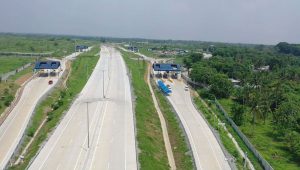Philippines urged to build more sustainable roads
THE PHILIPPINES should prioritize resilient transport infrastructure planning and operation to improve road quality, reduce travel time, and lower emissions, an official with the United Nations Economic and Social Commission for Asia and the Pacific (ESCAP) said. Weimin Ren, director of the ESCAP Transport Division, said the Philippines needs to “take a very active role […]

THE PHILIPPINES should prioritize resilient transport infrastructure planning and operation to improve road quality, reduce travel time, and lower emissions, an official with the United Nations Economic and Social Commission for Asia and the Pacific (ESCAP) said.
Weimin Ren, director of the ESCAP Transport Division, said the Philippines needs to “take a very active role in the regional cooperation on sustainable transport connectivity,” and added three highways to the Asian Highway Network last year.
The Philippines added three highways to the Asian Highway Network last year. The network is a regional transport cooperation platform aimed at enhancing the efficiency and development of road infrastructure.
“Integrated transport and land use planning will also help improve the sustainability of transport systems, through the reduction of distance traveled, enhance the efficiency of last-mile solutions and vehicular emissions,” Mr. Ren added.
He said the technological advancements, along with new pavement materials and the design, construction, maintenance, and upgrade needs of Asian highways, provide various opportunities to transition toward a more environmentally sustainable infrastructure design.
In comparison to “low-quality road transport infrastructure” that is more vulnerable to extreme weather.
Mr. Ren also noted that road safety should also be considered, citing that the Philippines road fatality increased to 11,062 in 2021, according to Global Status Reports for Road Safety by the World Health Organization.
“Ultimately, strategic investments in sustainable transport infrastructure would need to be prioritized to decrease transport externalities, while maintaining or improving transport accessibility,” he said.
He said such investments will improve the overall efficiency of the transport system, reduce environmental and social impacts of transport activities, and support the growth of sustainable transport options.
“To balance rapid motorization with sustainable practices, the Philippines can adopt the ‘Avoid-Shift-Improve’ (ASI) framework,” he said.
The “avoid” approach advocates reducing the need for travel through better urban planning, limiting car dependence by developing mixed-use communities.
“This would mean creating neighborhoods where work leisure, and essential services are within walking or cycling distance, reducing the demand for motorized transport,” Mr. Ren said.
Meanwhile the “shift” component refers to transitioning from private vehicles to more sustainable modes of transport, including public transport and active mobility, with greater system integration.
The “improve” portion of the framework targets increasing efficiency and reducing emissions of current transport modes.
This means promoting electric vehicles, enhancing fuel standards, and improving the operational efficiency of public transit, he said. — Aubrey Rose A. Inosante
















